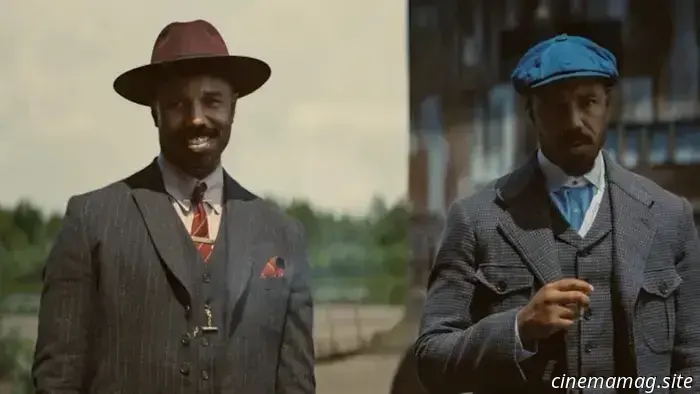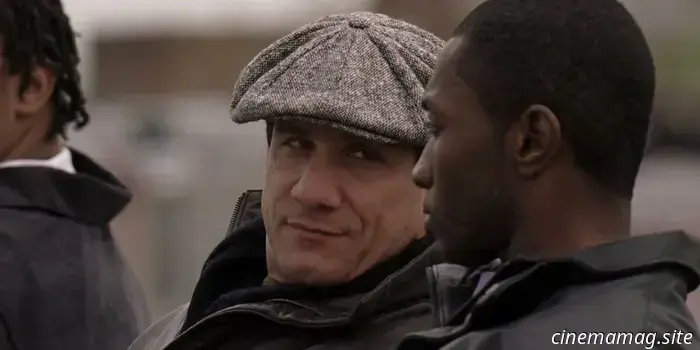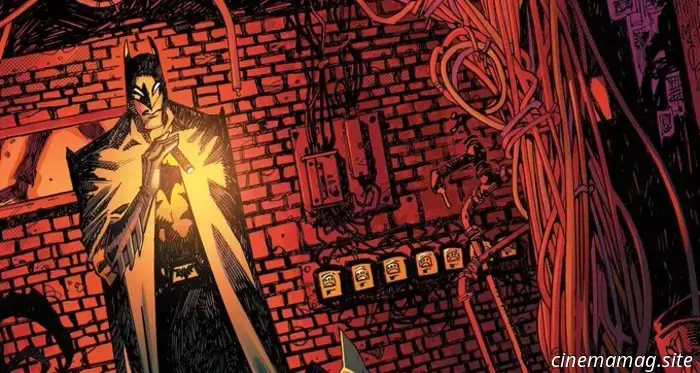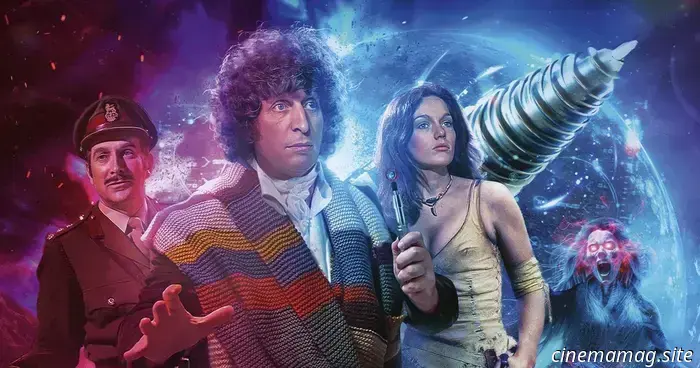
With Sinners, Ryan Coogler Securely Navigates the Intersection
Ryan Coogler’s captivating Sinners is richly infused with blues influences, notably reflected in the names of the twins, Smoke and Stack, played by Michael B. Jordan, which reference Howlin’ Wolf’s “Smokestack Lightning.” However, the film’s most profound connection may lie with Robert Johnson's “Crossroad.”
Johnson, a revered blues musician, is often regarded as the first rock star. He lived from 1911 until 1938, when he died from poisoning at the young age of 27. He is best remembered for his song “Crossroad,” also known as “Cross Road Blues,” and the legend surrounding it: one night, he visited a crossroad, knelt down, and bartered his soul to the devil for musical success.
This legend has been linked to numerous rock stars since, especially during times when people searched for Satanic messages within backwards-played records, and it plays a significant role in Sinners.
The film centers on Sammie Moore (Miles Canton), the son of a preacher who is drawn to his blues guitar. His father urges him not to pursue playing in juke joints like the ones the twins are opening, warning him that such places are sinful and a waste of life. Nevertheless, Sammie accepts the twins’ money and the chance for fame, stepping into the world.
Sinners leaves open the possibility that Sammie's choice may invite the ensuing chaos. Without revealing too much, viewers might interpret that Sammie has made his own pact at the crossroad.
A notable aspect of Ryan Coogler's arrangement with Warner Bros. regarding Sinners is that he will retain the rights to the film after 25 years. An anonymous executive mentioned to Vulture that Coogler's agreement could signal “the end of the studio system,” as studios often profit from exploiting existing intellectual property.
How did Coogler manage to secure such a deal for Sinners? His successful partnerships with Jordan, particularly in the Creed and Black Panther franchises, likely played a key role; Black Panther was the second-highest-grossing film of 2018 and contributed to a record-setting year for domestic box office revenue.
While Quentin Tarantino struck a similar deal for Once Upon a Time in Hollywood, it is uncommon for creators to maintain rights to their works, especially for Black artists like Coogler.
Anyone familiar with American history knows the longstanding narrative of white individuals profiting from the contributions of Black artists. Throughout history, numerous producers and executives, many of whom remain unnamed, have unjustly deprived countless Black artists of their due compensation.
Additionally, many well-intentioned white artists have built careers by capitalizing on the legacies of Black musicians.
Consider Johnson's “Crossroad,” also known as “Cross Road Blues.” Eric Clapton’s Cream recorded a more electrified version, “Crossroads,” in 1966, which helped ignite a surge of British and American artists, from Led Zeppelin to Aerosmith, covering songs created years earlier by Black blues musicians.
In some instances, the renditions by white rock stars offer their predecessors overdue recognition and potentially financial benefits for surviving Black artists or their estates.
However, in the most unfortunate and common scenarios, original Black blues artists or their heirs receive nothing, while white artists benefit from the blues' artistry without acknowledging the struggles that inspired it.
This phenomenon is effectively illustrated in a scene from the 2001 film Ghost World, where Steve Buscemi’s blues enthusiast is shocked by the opening band, Blues Hammer, a group of white performers singing about “picking cotton all day long.”
The narrative of Robert Johnson and “Crossroad” gained significant attention during the hair-metal era of the ’80s, inspiring the largely overlooked 1986 film Crossroads, featuring Ralph Macchio as a young guitarist seeking mentorship from an authentic blues musician, Willie Brown. The film remains obscure today, overshadowed by a 2002 Britney Spears film of the same name.
Crossroads marked Macchio’s second portrayal of a young white Italian-American embracing another culture — following his martial arts journey in The Karate Kid, released just two years prior.
In a curious edge typical of the ’80s, Crossroads concludes with Macchio and another guitarist, played by Italian-American Steve Vai, competing for blues guitar supremacy in a juke joint akin to the one the twins establish in Sinners, resembling a precursor to 8 Mile.
One could argue that both The Karate Kid and Crossroad exploit Asian and Black cultures, respectively, through a white protagonist's lens, or contend that neither film would have been produced in the 1980s without a young white lead — or maybe even both perspectives hold true.
The Blues Brothers raises a similar question: Is it a tale of white comedians profiting from Black culture, or of white individuals aiding in the cross-cultural dissemination of Black music? Or perhaps both? Before Sinners, how often did many of us encounter the blues outside the House of Blues
Other articles
 Paul Ben-Victor to portray a Lantern in the DCU series.
In HBO's forthcoming DCU series Lanterns, the Green Lanterns will encounter a new foe. According to Deadline, Paul Ben-Victor (The Wire) has been cast in a recurring role as what appears to be a villain opposing Aaron Pierre and Kyle Chandler’s characters, John Stewart and Hal Jordan. Lanterns will focus on the Green Lanterns Hal Jordan and John Stewart, […]
Paul Ben-Victor to portray a Lantern in the DCU series.
In HBO's forthcoming DCU series Lanterns, the Green Lanterns will encounter a new foe. According to Deadline, Paul Ben-Victor (The Wire) has been cast in a recurring role as what appears to be a villain opposing Aaron Pierre and Kyle Chandler’s characters, John Stewart and Hal Jordan. Lanterns will focus on the Green Lanterns Hal Jordan and John Stewart, […]
 A new trailer and poster have been released for Guy Ritchie's Fountain of Youth.
In anticipation of its release on Apple TV+ next month, a new trailer and poster have been unveiled for Guy Ritchie’s mystery-adventure, Fountain of Youth. John Krasinski and Natalie Portman play the roles of estranged siblings who undertake a transformative, worldwide journey in pursuit of the fabled Fountain of Youth. Alongside Krasinski and Portman, […]
A new trailer and poster have been released for Guy Ritchie's Fountain of Youth.
In anticipation of its release on Apple TV+ next month, a new trailer and poster have been unveiled for Guy Ritchie’s mystery-adventure, Fountain of Youth. John Krasinski and Natalie Portman play the roles of estranged siblings who undertake a transformative, worldwide journey in pursuit of the fabled Fountain of Youth. Alongside Krasinski and Portman, […]
 Mission: Impossible - The Final Reckoning character posters showcase a large ensemble cast.
We are now only a month away from the much-anticipated Mission: Impossible – The Final Reckoning, starring Tom Cruise. Paramount has unveiled an extensive set of character posters showcasing the ensemble cast for Ethan Hunt's upcoming – and possibly final – mission. Take a look at them here... Mission: Impossible – The Final Reckoning is directed by Christopher McQuarrie [...]
Mission: Impossible - The Final Reckoning character posters showcase a large ensemble cast.
We are now only a month away from the much-anticipated Mission: Impossible – The Final Reckoning, starring Tom Cruise. Paramount has unveiled an extensive set of character posters showcasing the ensemble cast for Ethan Hunt's upcoming – and possibly final – mission. Take a look at them here... Mission: Impossible – The Final Reckoning is directed by Christopher McQuarrie [...]
 Preview of Detective Comics Annual 2025 #1 - Comic Book
Next week, DC will publish Detective Comics Annual 2025 #1, and you can check out an exclusive preview right now with the official sneak peek below… A MYSTERY THAT EVEN BATMAN CAN’T UNRAVEL! Batman is trapped in a chilling case that continues to elude him. The Dark Knight now has to navigate through some […]
Preview of Detective Comics Annual 2025 #1 - Comic Book
Next week, DC will publish Detective Comics Annual 2025 #1, and you can check out an exclusive preview right now with the official sneak peek below… A MYSTERY THAT EVEN BATMAN CAN’T UNRAVEL! Batman is trapped in a chilling case that continues to elude him. The Dark Knight now has to navigate through some […]
 Tom Baker will reprise his role in Doctor Who: The Fourth Doctor Adventures - The Ruins of Kaerula this June.
Big Finish has announced that a new full-cast audio drama featuring the Fourth Doctor will be released this June. Titled Doctor Who: The Fourth Doctor Adventures – The Ruins of Kaerula, it introduces further challenges for Tom Baker's Doctor as he journeys with Leela and K9 through unusual time anomalies. The Fourth Doctor’s forthcoming time-related adventures […]
Tom Baker will reprise his role in Doctor Who: The Fourth Doctor Adventures - The Ruins of Kaerula this June.
Big Finish has announced that a new full-cast audio drama featuring the Fourth Doctor will be released this June. Titled Doctor Who: The Fourth Doctor Adventures – The Ruins of Kaerula, it introduces further challenges for Tom Baker's Doctor as he journeys with Leela and K9 through unusual time anomalies. The Fourth Doctor’s forthcoming time-related adventures […]
 New to Streaming: No Other Land, Havoc, The Room Next Door, Conclave, Tendaberry, and more.
Every week, we showcase the significant titles that have recently arrived on streaming services in the United States. Take a look at this week's picks below and previous collections here. Babygirl (Halina Reijn) Making a splash at the Venice Film Festival, Halina Reijn's follow-up to Bodies Bodies Bodies, Babygirl, features Nicole Kidman as a successful CEO who prioritizes her career and family.
New to Streaming: No Other Land, Havoc, The Room Next Door, Conclave, Tendaberry, and more.
Every week, we showcase the significant titles that have recently arrived on streaming services in the United States. Take a look at this week's picks below and previous collections here. Babygirl (Halina Reijn) Making a splash at the Venice Film Festival, Halina Reijn's follow-up to Bodies Bodies Bodies, Babygirl, features Nicole Kidman as a successful CEO who prioritizes her career and family.
With Sinners, Ryan Coogler Securely Navigates the Intersection
Ryan Coogler's captivating Sinners is beautifully infused with the essence of the blues: Among the clearest references to the genre are the names of the twin characters, Smoke and Stack.
